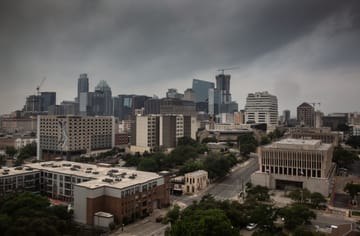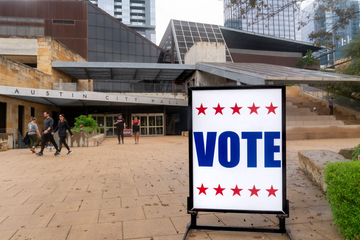☀️ Heya, Austin.
If there's one thing we love, it's talkin' to cool people. Today that cool person is Thom Singer, an Austin resident of 33 years and the CEO of the Austin Tech Council. We chatted about how the city's changed since the early ’90s, what put Austin's tech scene on the map and just how much Elon Musk has had an effect on the area.
Then, check out 3 green things Austin's thinking about adopting, and see which tech giant just extended its contract in the metro area until 2099.
UT, the 'Dell Effect' and our (sometimes) perfect weather
Thom Singer has been the CEO of Austin Technology Council since June 2022. He's worked in the business world since well before that and has lived in Austin since 1991. So he's got, ya know, some street cred.

This interview has been lightly edited for length and clarity.
What exactly is the Austin Tech Council?
A 32-year-old organization that was founded to help put tech on the map and bring the players in the then-very small tech community together and to work towards the growth of building an ecosystem. So we still exist today as a membership group whose purpose is to support all things growth for technology companies in Austin.
How long have you been in Austin?
Since 1991. My then-girlfriend came here for a different job. We got engaged here, married here, raised our kids here. And we thought we would stay three years here, and we stayed 33.
How have you seen the city change since then?
Some people don’t like it, but the reality is that change and growth is part of what happens to cities. So the biggest changes that I’ve seen is obviously the sheer numbers of people. But with that comes all of the chain stores and restaurants and things like that. The culture of the city has changed a little bit. You know, when we say 'Keep Austin Weird,' I don’t think we are as weird as we were. I think we still hold onto our history and our vibe of it though, and I think that’s very important. But it’s still a very young, dynamic city that’s focused on that innovation and creation. It was that way 33 years ago, and I think it’s that way now. It’s just that now it’s larger and everybody knows us. No one knew where Austin was 33 years ago. So that’s the other thing, having the attention of the world on our tech community is different than it was.
How would you describe the different phases of the tech scene?
A lot of people think the tech scene in Austin really got started about 15 years ago. And the reality is you can take this back to 1966 with the hiring of Dr. George Kozmetsky at the University of Texas. He’s responsible for doing many things. One, really rallying the business community to start thinking about growth because, he had a famous saying, somebody told me. ‘If we don’t create a vibrant business community, where will our grandchildren work?’ We were a university town and a government town. The growth goes back to the 1960s. You have IBM and Texas Instruments and other companies coming at that time. You had all the semiconductor companies in the ’80s.
"It used to be, if you spend a year networking in Austin, you knew or were once removed from everybody. I just don’t think that works in a town of 2.4 million like it did in a town of 700,000."
In the ’90s, we become very software-focused and growth-focused, and through the ’80s and ’90s, you have the growth of Dell Computers in there, you have Tivoli and Trilogy and several other companies that come up in the late ’80s and early ’90s that spin off entrepreneurs and spin off investors, which is very important. We had the growth of the ecosystem, meaning the lawyers, the accountants, the consultants. And in the 2010s, you start seeing the beginning of the move of the large multinational tech companies to Austin. And then you have the huge growth of remote workers moving here during the pandemic.
Is there a single answer for when people ask you who or what put Austin’s tech scene on the map?
I’ve identified what I call sort of the 10 pillars that created a perfect storm for Austin to become what it is today. Different pillars had different strengths at different times, so I don’t think it was any one thing. But when you start taking some of them out, would you have the culmination of everything?
Austin, as a city, has seen ups and downs. And our lows have been less low than the rest of the country over the past 30 years. And our ups have been higher than the rest of the country in the last few years.
It’s the University of Texas and George Kozmetsky, being located in the center of the country and having decent weather all year round. It is a pro-business climate within the state of Texas and oftentimes within the city of Austin, SXSW, the organizations and support groups that include Opportunity Austin, Chamber of Commerce, Austin Technology Council, Capital Factory, Austin Women in Technology. It’s having the funding available, both angel and VC funding. It’s having the service providers like the law firms and banks and consulting firms that all have a presence here. There’s also the Dell Effect, and it’s not just Dell, it was Tivoli and Trilogy and about eight other companies, that spun out entrepreneurs and wealth to invest.
Do you think there’s anything specific that sets this city’s tech scene apart from others?
I think historically we have been a city that everyone has been open to meeting other people. There wasn’t a ‘Do you have the right pedigree? Do you have the right connections?’ I think we were a town where people showed up. It wasn’t just like a curated dinner of CEOs. Those exist and they’re important and they’re good, but I think people showed up at the technology council, the chamber, all the different events. Having access to leaders and being able to find mentors organically was something that I think set us apart from all the other cities. Now, as we get larger, it’s harder for everyone to know everybody. It used to be, if you spend a year networking in Austin, you knew or were once removed from everybody. I just don’t think that works in a town of 2.4 million like it did in a town of 700,000. So have we lost that? No, I think we’re still a town where people are willing to have those conversations. I just think we need to pay attention to not lose it.
Do you think Elon Musk has had an impact on the Austin tech world? Do you think the community would be to the level it is now if it weren’t for him and his companies?
Yeah, I think we’d be where we are now. I think he came after Austin had reached kind of that critical mass of growth. That being said, anyone who wants to bring high-paying, good jobs to Central Texas is doing a good thing for Central Texas. Do they contribute? Yes. And it would be nice if we saw more of their contribution in the community, meaning having more of their leaders show up and participate in all the boards of the different organizations that are there. It’d be nice to have more grassroots participation from the employees of those companies. But I think for the people who are critical, my belief is that more good-paying jobs in tech is a good thing for the region.
It’s unfortunate about the layoffs. I think the number is 2,700?
You know, Austin, as a city, has seen ups and downs. And our lows have been less low than the rest of the country over the past 30 years. And our ups have been higher than the rest of the country in the last few years. So historically, when people get laid off, in a reasonable amount of time, our tech community absorbs them. We have a growing amount of things happening here, more manufacturing jobs moving here over time. So I feel bad anytime anyone’s laid off, but I think Austin has proved over 30 years that the day you get laid off is a bad day, but there’s still a strong future in Austin.
Tell us about what Austin Tech Council’s working on with both the newly launched Austin Hall of Fame and the First-Time Founder Award.
For Austin Hall of Fame, we decided we’re going to add six legacy people a year for six years (and these are people that laid the foundation to create what Austin is today) and one current inductee every year. Then we’re also doing a First-Time Founder Award to someone who has launched their first company and is doing well. There are so many people who are on their first company and are kicking butt. So you don’t necessarily know who they are and get to honor them, so we want to do that.
— Katie Canales, Editor

Temperature: 89 degrees | Sun: Two-stepping with clouds | What to Expect: Feeling sticky
If Monday wasn’t humid enough, we’ll get several more days like it this week. Morning clouds and fog will give way to some sunshine in the afternoon. This will be the hottest day of the week, with heat index readings in the 90s.
Mary’s Tip: It’s about time to bust out your Texas-size water bottles while exercising. Studies have shown that you can sweat almost a liter for every hour spent in 90-degree heat.

Sustainable Austin: 3 Earth-focused initiatives the city is considering
🌱 Make it an agrihood. The Housing and Planning Commission met last Tuesday to discuss the benefits and possibility of supporting the creation of agrihoods in northeast Austin.
“Austin and surrounding areas have ample opportunities to utilize available farm assets for additional Agrihoods that focus on affordable, workforce and attainable housing, drastically improved food access, health and wellness, interruption of isolation and many other farm to table lifestyle benefits," Council Member Natasha Harper-Madison, who chairs the commission, wrote on the city’s message board ahead of the meeting.
The Commission passed a resolution recommending City Council direct staff to investigate existing impediments, explore a pilot program in the North East Planning District and to find ways to support agrihoods through zoning, tax incentives or collaboration with the county.
- What is an agrihood? In short, usually a mixed-use development that combines residential buildings with a working farm or community garden, i.e. agriculture + neighborhood. (Read more about the idea in this Forbes article.)
- Does Austin have an agrihood? Yes. Austin’s first and only agrihood so far is Village Farm — a tiny home community built around Green Gate Farms.
🐦 Protect the birds. The Travis Audobon Society is hoping Austin will become the first Texas city to adopt bird-friendly building policies for new construction or retrofits. The Society recently commissioned a report on bird-safe buildings that was presented to the Design Commission last week.
Some key points:
- Austin is in the path of North America’s primary migration corridor for birds, and Travis County alone sees more species of birds than the whole of more than 14 states across the country.
- An estimated 621 million to 2 billion birds die at windows across the U.S. every year, but every building that is designed to meet bird-safe standards has the ability to save dozens to hundreds of birds per building per year.
- While costs may vary, if bird safe designs are taken into consideration from the start, it can be minimal and result in substantial energy savings.
Read more: The Austin Monitor has more on the report’s presentation to the Design Commission, or scroll through the presentation yourself.
🚰 How to save water. Austin Water will bring proposed amendments (and stricter measures) to the water conservation and drought contingency regulations to City Council this week in an effort to better address Austin’s continuing drought.
- We’re in a drought? Yes. The drought began in June 2022 when lake levels fell to 70 percent of their normal capacity. We’re now in a Stage 2 drought with lake capacity hovering around 42 percent.
- What would change? Among other things, the changes would implement immediate penalties for first-time code violators and athletic fields would no longer be exempt from watering restrictions during Stage 3 drought.
— Cat DeLaura, Reporter

3 things to know about Dell's 106-year updated agreement with Round Rock
Dell's like that layer of sweat that'll be sitting on our foreheads from June through September: It ain't goin' nowhere.
The OG Austin homegrown company is in the metro area to stay, according to an amendment that Round Rock City Council OK'd recently that updated an agreement from 1993 to be in effect for 106 years instead of the original 66 years.
Here's what to know:
- The agreement specifically extends the contract to December 2099. It basically lays out what kind of tax incentives the city gives to Dell.
- Dell hanging its hat in Round Rock has boosted the city's property tax base. So, projects like water treatment, roadwork and new development have all seen the light of day.
- Quote Check: "This has been a great relationship and, quite honestly, it changed the trajectory of Round Rock," a Round Rock City Council member said, per Community Impact.
In case you missed it: Read up on what Michael Dell had to say about the Austin area at SXSW in March.
🌬️ In Gear
Today's clue is for 3 Down: The name of an Austin homegrown vodka with an iconic orange cap.

What'd you think of today's issue?
- 👍 10 points to Gryffindor. Y'all killed it.
- 😐 Meh. Wasn't bad, wasn't great.
- 👎 Yeah it's gonna be a no from me, dawg.

We’re so glad you found us. Find our bios and contact info here, or reach out at hello@austindaily.com. Behind today’s send: Katie Canales, Cat DeLaura and Mary Wasson.


